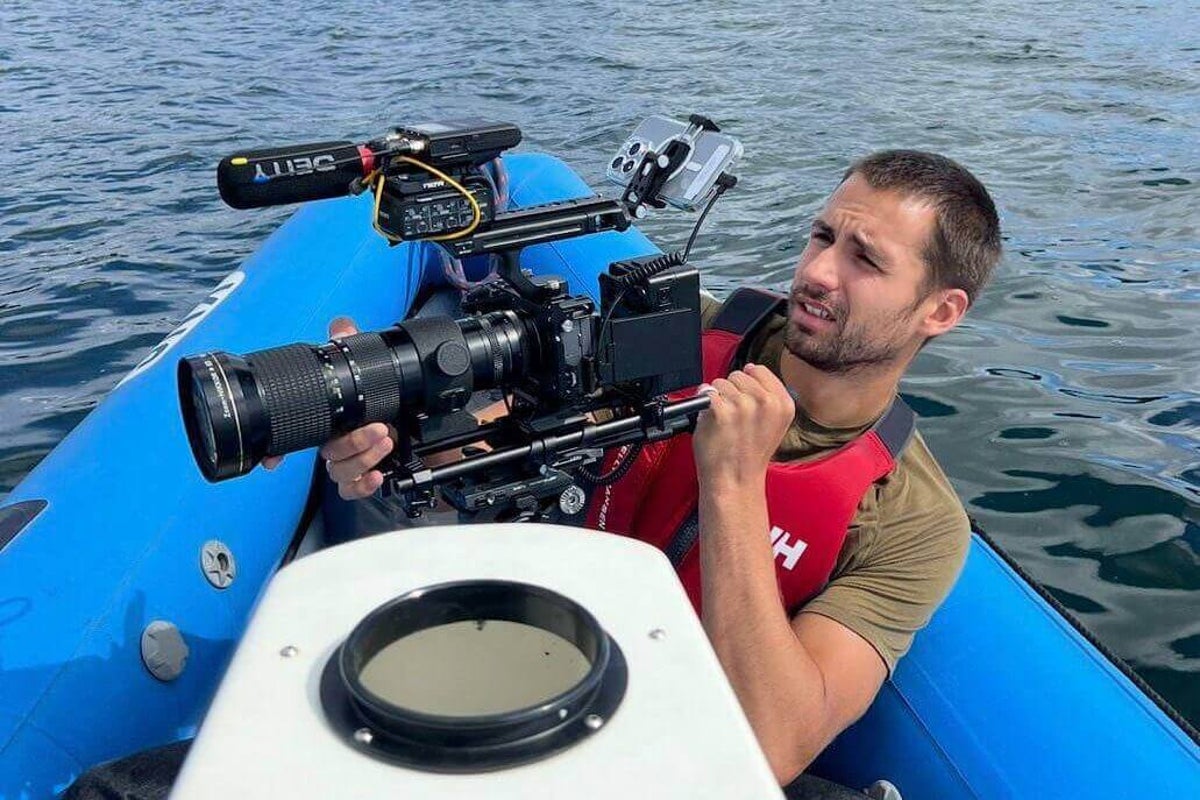Alfie Whiteman was never your typical footballer.
As Tottenham Hotspur’s third-, fourth- or latterly fifth-choice goalkeeper, the prospects of making an impact for his boyhood club on the pitch were slim. So, in his free time, he channelled his energy into different passions: taking acting classes, developing his skills as a photographer and hosting a monthly radio show where the listed genres are folk, indie rock, leftfield pop and dream pop.
And while his team-mates whisked into the training ground in supercars, he travelled on public transport.
After leaving Spurs as a free agent this summer, he expected to continue his career, perhaps lower down the English football pyramid or abroad, where he would have the chance to prove himself as a No 1.
However, despite receiving concrete interest from clubs as high as the English Championship, Whiteman decided to quietly retire from the game on his own terms this summer at just 26, just months after winning the Europa League.
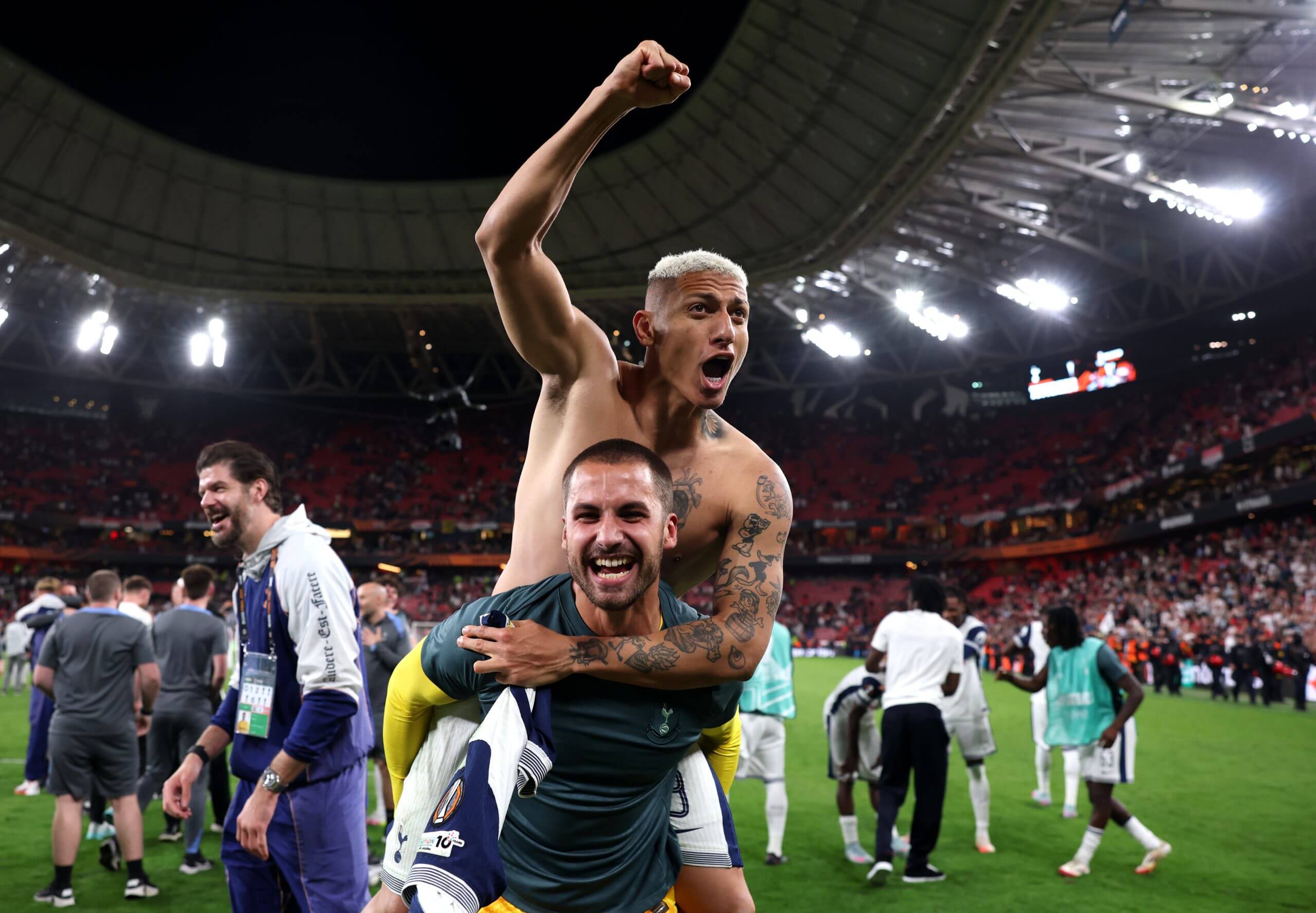
Whiteman and Richarlison celebrate Tottenham’s Europa League win in Bilbao (Alex Pantling/Getty Images)
Whiteman is beginning a new career as a budding photographer and film director signed to Somesuch, a global production company with offices in London and Los Angeles. It is the studio behind Harris Dickinson’s directorial feature film debut ‘Urchin’ and Aneil Karia’s ‘The Long Goodbye’, winner of the Oscar for Best Live Action Short at the 2022 Academy Awards.
While it was not an easy decision, it has been years in the making.
“I signed for Spurs at 10 years old,” Whiteman tells The Athletic over a jug of lemonade at a cocktail bar in east London. “Then I left school at 16 and went straight into this full-time life of football. When I was around 17 or 18, living in digs, I just had this feeling inside of, ‘Is this it?’ Getting on the mini bus, going to training, doing the Sports Science BTEC (he also did an A Level in Economics) and going home to play video games. I realised, ‘Oh, I’m not happy here’ from quite a young age.
“The stereotype of a footballer is generally quite true. It’s the golf, washbag culture. I was that young footballer. I wanted the Gucci washbag and I drove the Mercedes. You all just become a reflection of each other. You’re a product of your environment. It’s the way football is in this country; it’s so shut off from anything else. You go to training and then you go home, that’s it.
“I guess I always felt a little bit different. My team-mates — who I got on well with — called me a hippie. That was their definition. But then, when I was 18, I met my ex-girlfriend, who was a model. She was a bit older than me. Her best friend was a director. It just started opening my eyes to what life has to offer.
“So as I was getting a bit older around 18 or 19, I started meeting new people and realising a bit more about myself, and understanding the football bubble, because it’s so insular.”
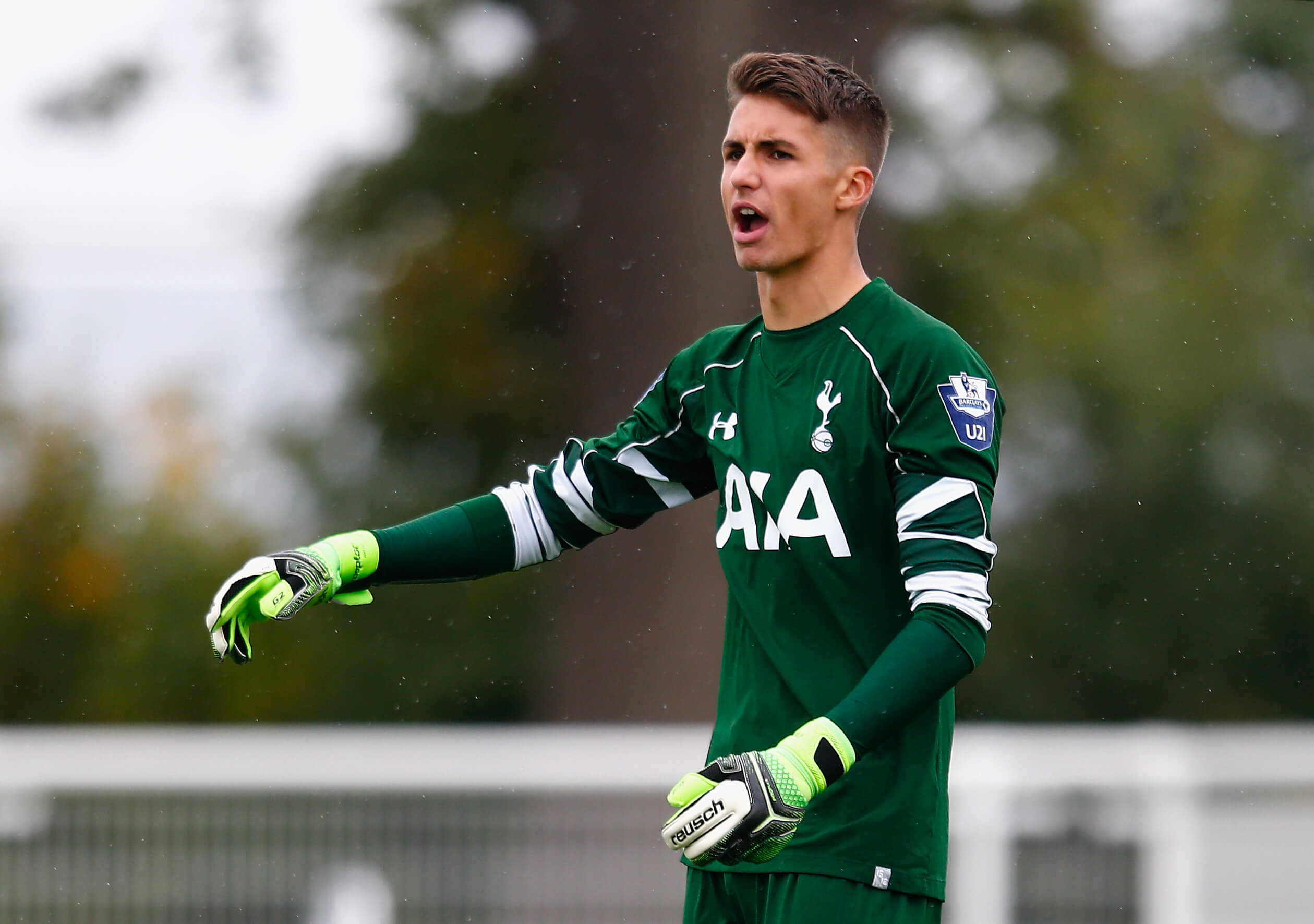
A 16-year-old Whiteman during a match for Tottenham Under-21s in 2015 (Julian Finney/Getty Images)
Stuck behind internationals Hugo Lloris, Michel Vorm and Joe Hart in the goalkeeping pecking order, Whiteman continued training hard with the hope of one day representing Spurs as a professional or developing elsewhere on loan. Meanwhile, he was mixing with new crowds in his free time and making friends within the creative industry. On his days off, producers, directors and photographers invited him to assist them as a runner on set. While he expected it would happen well into his 30s, Whiteman was consciously setting himself up for a life after football.
“Football is a short career regardless, even if you do really well, and I knew that I didn’t want to stay in it,” says Whiteman. “It was about trying to gain experience and be proactive in learning about these things I was also interested in, but mainly because I was enjoying it, and was surrounded by the kinds of people that were doing what I enjoyed as a job. They were making things. It was really inspiring.”
Whiteman made one appearance for Tottenham as a second-half substitute in a Europa League match under Jose Mourinho before moving on loan to Degerfors in Sweden in 2021. There, he had the opportunity to play frequently and build form on the pitch, making 34 appearances across an 18-month period in Sweden’s top flight. Living in a small cabin in the woods, Whiteman spent large amounts of his time alone, exploring his feelings through art.
“I learned a lot,” he says. “I was in a new environment, in nature. I’ve got this exhibition coming up in spring about a body of work I did while I was there, which is all these self-portraits and weird things. I never planned it to be, but it served as this period of introspection. I look at the work now, and these feelings of being a bit lost or torn are in it. That was in 2022, so it’s always been there.”
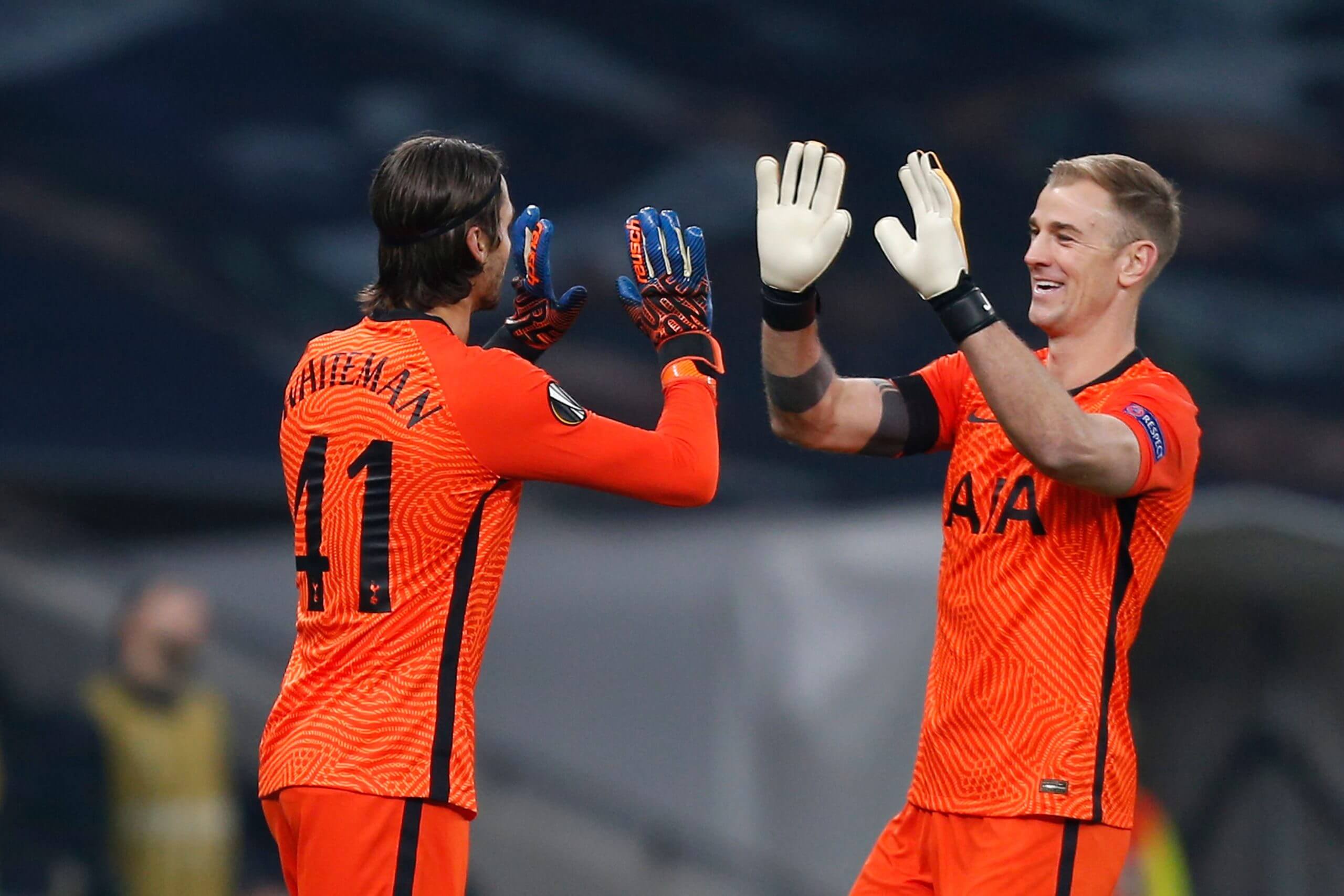
Joe Hart and Whiteman, as the latter makes his Spurs debut against Ludogorets in November 2020 (Ian Kingston/Getty Images)
He returned to Spurs determined to make an impact and signed a two-year extension in 2023. Under new coach Ange Postecoglou, Whiteman played and trained well in pre-season, but his progress was halted after sustaining an ankle injury in Singapore, which would keep him out for most of the season. His ‘Sweet Tooth’ show on NTS, a radio channel founded in east London in 2011 focusing on eclectic music from around the world, served as a creative outlet through the toil of recuperation. Reflecting on the injury now, Whiteman sees it as a sliding doors moment.
“It was a kind of freak injury, causing me to miss most of the season, where a new manager comes in,” says Whiteman. “So I was immediately in this bad situation. But during that rehab, I worked so hard every day to try to get back. I eventually did, but even then, it was just to be sat in the stands. It was so hard applying myself and really trying and then just not getting the games.
“That’s where you show the work you’re doing. Otherwise, the training and stuff, it’s all repetitive and in the shadows. It’s like f***ing Groundhog Day. Tottenham have an incredible training ground with incredible facilities, and I was working with the best players. But it wasn’t fulfilling. I want to be in a high-pressure game, or feel progress. When you’re not playing, it’s very difficult to do. It’s even worse, it’s more like you’re regressing.”
Whiteman, who represented England at the under-17 World Cup in 2015, made it clear to the Tottenham hierarchy after recovering from his injury in summer 2024 that he would like to leave the club on loan to explore first-team opportunities. But with Spurs short on club-trained players for their upcoming Europa League campaign (clubs are required to involve four players developed in their own academy for UEFA competition), the club would not sanction a move away.
He describes the lack of control as “frustrating”. The season ended with Spurs winning the Europa League, with Whiteman collecting a winners’ medal and circling through Tottenham, the neighbourhood in which he grew up, on a bus in the parade.
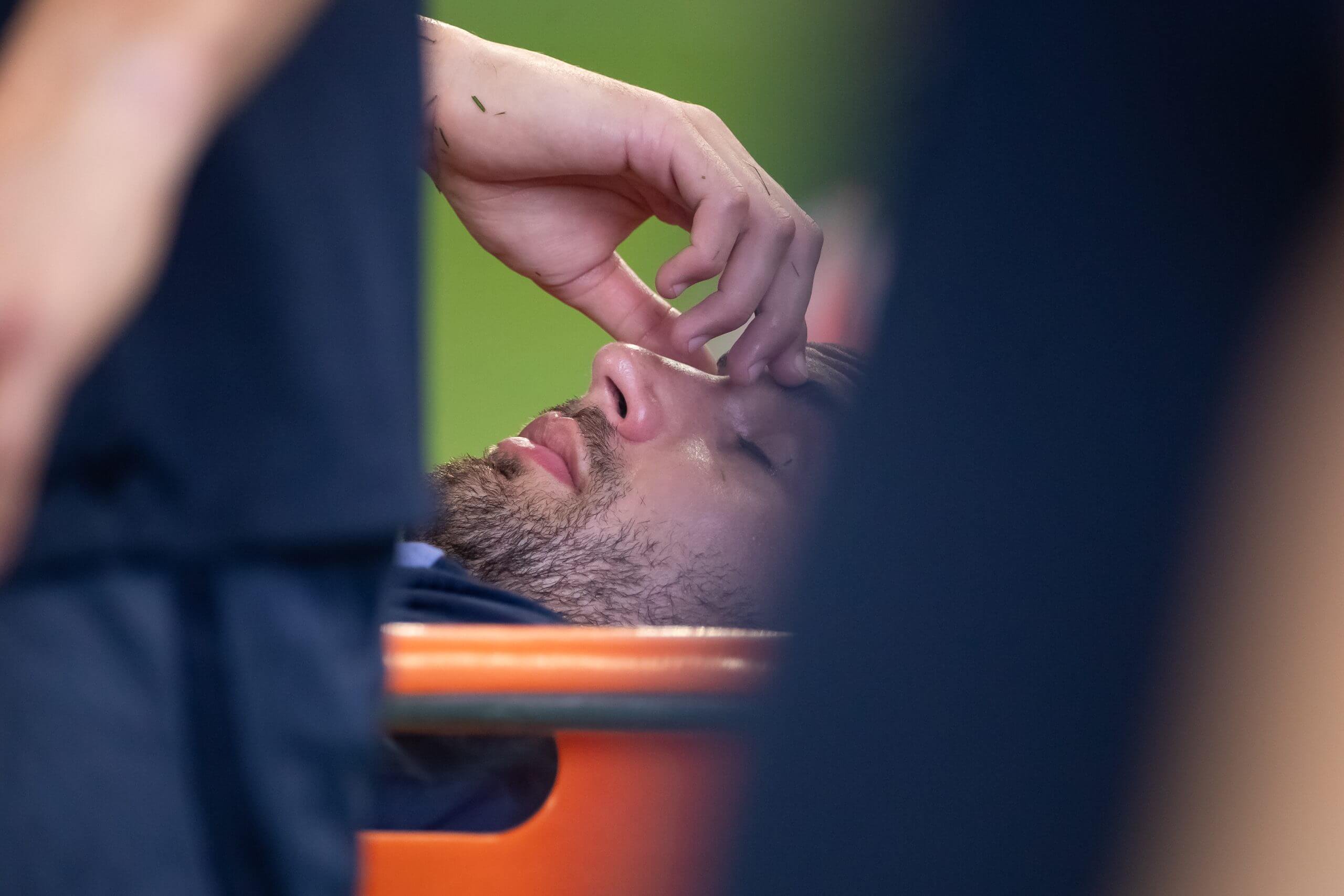
An injury suffered on Tottenham’s 2023 summer tour in Singapore was a massive blow to Whiteman (MB Media/Getty Images)
“My house is two minutes from the stadium,” says Whiteman. “I used to walk to the home games. So the bus goes past my road, my sister, my best friend who lives at the house with me, they’re there waving from my street. I spotted a girl who goes to the youth centre that I was volunteering at; I did her headshots because she wants to be an actor. I was like, ‘Hey!’ And she was there in disbelief like, ‘What are you doing on the bus?’ It was funny.”
Whiteman went on trial at two clubs in the English Football League in the summer. The first, a League One side, could not offer a contract due to financial issues. He then went on trial with a Championship club, who offered him an initial six-month contract as a No 2. However, by the time the contract offer came, he had decided professional football was no longer for him.
“There was a weekend when I went home, and I started contemplating all my options,” says Whiteman. “I had other things I’ve been building on the side and it was more exciting to me. To put it plainly, I saw happiness in these other avenues.
“It got to this point where I’d rather end this on my terms than go to a club that I just didn’t want to go to. When I was younger, I always said I didn’t want to play in the lower leagues; it was always about the highest level. Otherwise, I’d rather do something else. So I just took this step into the unknown, and I was like, ‘Oh, holy s***. I’m actually doing it.’ Anything can happen. I’m in complete control of my life, and it’s really exciting and really scary.”
Within days of calling his agent to inform him of his decision, Whiteman was on set with fashion photographer Harley Weir and British rapper Central Cee for a Nike shoot. He later travelled to Norway and Ukraine to help his friend Aria Shahrokhshahi film a feature documentary. In between, he was getting in contact with people in the industry and introducing himself over coffee.

Alfie Whiteman on set (Elliot Jones)
“I ended up going to assist my friend for this photography job for Vibram (a footwear company known for their ‘five finger’ shoes) at the World Toe Wrestling Championships,” says Whiteman. “I was like, ‘Yeah, I’ll come hold the lights!’ And the day before that shoot, they asked for a video, too, so I was like, ‘I’ll do it. I’ll do it!’
“There was no budget or brief, nothing. I turned up with him on the day and ran around with my camera, and then took it to an editor, sat with him, and made this thing and it got posted.”
The short film was a critical success, earning a five-star review from David Reviews, a prominent outlet within the short-form content space. Within weeks, he was signed to Somesuch as a professional film and commercial director.
“Somesuch have their film and commercials departments and I do photography,” says Whiteman. “I’ve got project ideas for photo stuff and short film ideas. The plan is to do some short films, and then hopefully one day a feature-length. But there are no real strict steps. You can decide. I just want to be on set and work with some of the most talented cinematographers, DoPs (directors of photography), producers and meet new people. There’s just so much to learn.”
While he has not watched any football since his retirement, he’s not turning his back on the game completely. He has ideas for films based on next summer’s World Cup in North America, and is excited to pick up the gloves again soon — without any of the politics of the industry attached.
“I’m really excited to go and play on a Wednesday night with my mates,” he says. “I’ve had a load of friends inquiring! I just enjoy playing football with my friends. It’s pure.”

